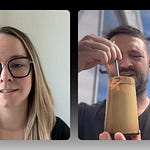The spark
Seth’s tiny post today is a Godin Cookie: “Our biggest commitments, the things we are most dedicated to, rarely pay us back in equal measure. That might be the point.” Short, sharp, and it pulls you into a bigger question: what are you giving yourself to that won’t ever be “even”—and why is that good?
—
Today’s guest: Jay Kranda
Jay Kranda is the Innovative Tech Pastor at Saddleback Church (15+ years) and author of Online Church Is Not the Answer: Beyond Just Streaming Church to Hybrid Disciple Making (Audible + Amazon). We first met in Amman, Jordan, helping ministries shift from broadcast to social - so he’s the perfect voice for a conversation about commitment, community, and the long game.
—
Our take (highlights from the conversation)
Meaning > math: Parenting is the obvious example. The time, money, and emotional load will never “return” 1:1. The return is the relationship and the person your child becomes.
Commitment clarifies values: If you only do what pays back immediately, you’ll optimize for transactions and end up alone with your to‑do list.
Reciprocity vs. reciprocal accounting: Cialdini’s reciprocity (give → inclined to give back) is real and useful. But Seth’s point stretches beyond persuasion: some commitments are asymmetrical by design.
Faith + friction: Jay notes that we need the pebble in the shoe—the reminder that we’re human and not in control. Asymmetry humbles and forms us.
Keep it simple: Big ideas don’t need big words. The shortest posts sometimes do the deepest work because they force us to fill in the blanks.
—
A simple playbook for leaders, parents, and makers
Name your non‑negotiables. List the 1–3 commitments you’ll keep even when there’s no visible payback (family dinners, mentoring, weekly shipping, Sunday service).
Switch your metric. For these, measure presence, trust, and learning—not hours, dollars, or likes.
Bank visible progress. Write a two‑line log after each rep: What I did / What I learned. Meaning grows when you notice it. (Super nerdy, but who knows what you might learn!)
Practice generous reciprocity. Use Cialdini’s principle wisely - give first, follow up humanly - but don’t confuse persuasion tactics with your life’s purpose.
Design for the long game. Build rhythms (not heroics): daily touch, weekly review, monthly reflection. Asymmetry becomes sustainable with cadence.
—
Try this this week
One “uneven” yes: Pick a small, unscored act (help a teammate, read to your kid, volunteer 30 minutes) and do it without tracking.
Rewrite one KPI: Add a “felt‑meaning” note to your weekly scorecard. One sentence is enough.
Share one story: Tell your team or family where an asymmetrical commitment produced unexpected joy or growth.
—
Why it matters
Transactions are tidy; transformation is not. The best parts of our lives—family, faith, friendship, craft—refuse to settle invoices. Choosing them anyway is how we become the people we hoped we’d be.
—
Your turn
Where are you investing beyond a clean payback—at home, at work, or in your community? What’s one commitment you’ll keep this month even if it never “balances”? Drop your story in the comments so we can learn from each other.















